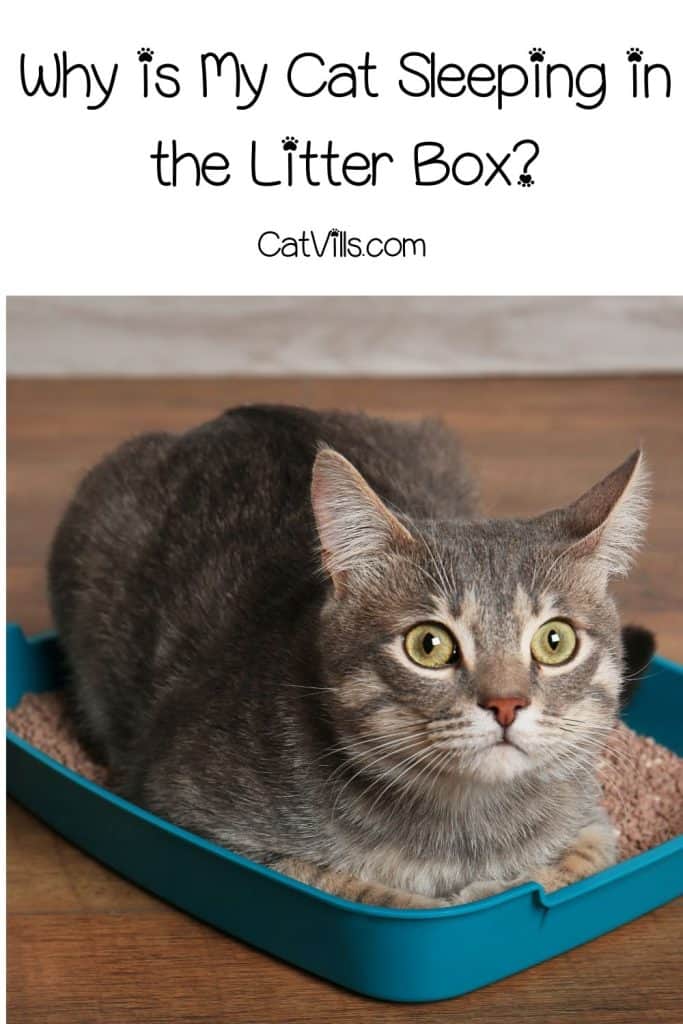Last Updated: 2 years ago
Are you scratching your head trying to figure out, “Why is my cat sleeping in the litter box?”
While cats sleep in various positions all over the house, it’s natural to freak out when you find your feline friend asleep in such a weird place.
So, keep reading to discover 10 reasons why your cat is sleeping in the litter box.
What Does it Mean When Your Cat Sleeps in the Litter Box?
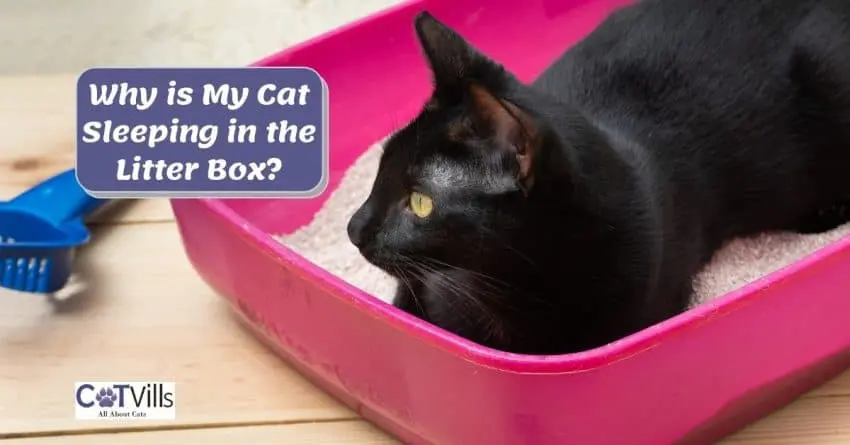
In many cases, your cat sleeping in their litterbox regularly can mean that they are experiencing fear or anxiety.
This fear and/or anxiety can have a variety of causes, such as new animals in the home, loud and upsetting noises, bodily pain, an unknown illness, or just a result of moving to a new place.
They sleep in their litter box because it feels like a safe space. Some cats may just naturally have more anxiety than others, so sleeping in the litterbox is not necessarily a sign of distress.
10 Reasons Why Cat Is Sleeping in the Litter Box
Cats are notorious for falling asleep in unimaginable locations, such as drawers, wardrobes, laundry baskets, and bags.
However, it’s still quite a shock to find your cat napping in their toilet. And you’d be right to consider it a red flag.
So, why is my cat sleeping in the litter box? Usually, cats sleep in their litter box due to behavioral reasons or medical reasons, such as urinary tract infections.
To help you find a solution to this unusual problem, let’s talk in detail about why your cat is sleeping in their toilet box.
#1 Your Cat Has Urinary Issues
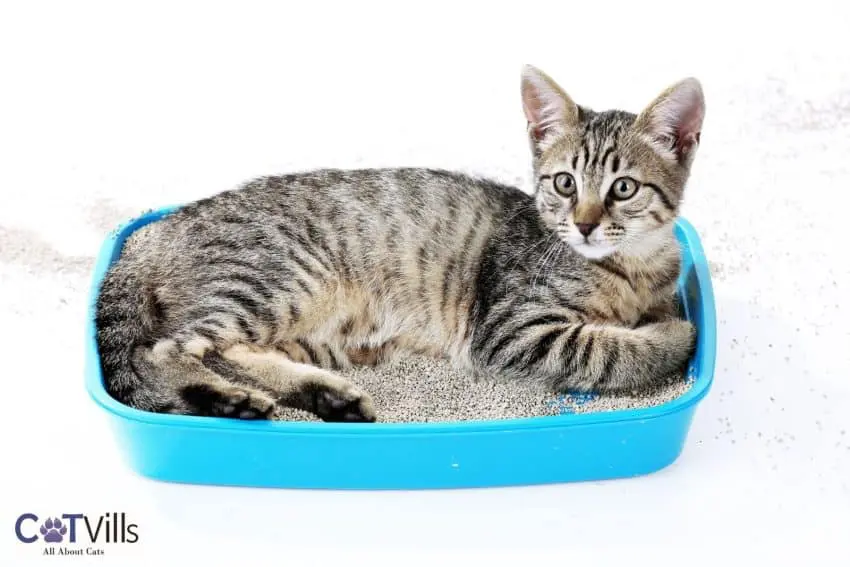
Unfortunately, some cats fall asleep in their litter box because they have problems urinating or are peeing too frequently.
As Sandra Mitchel, a vet, explains, “Most cats with urinary tract infections will make frequent trips to the litter box.” That’s why some cats prefer to stay in the litter box in case they have to pee.
Male cats are also prone to urinary blockage, making it painful or impossible to pass urine. While some tomcats strain to urinate around the house, others may choose to stay in the litter box.
Besides urinary tract infections, diabetes, bladder stones, and chronic kidney disease can also make your cat urinate frequently.
Moreover, urinary obstruction is a medical emergency, and your cat can take a turn for the worse in just a couple of hours. As such, you should talk to your vet if you notice any changes in your cat’s toilet habits.
#2 Your Cat Is in Pain
Sometimes cats spend more time than usual in their litter box because of stomach problems, such as diarrhea or constipation.
In other situations, your cat is so ill it doesn’t have the strength to leave its toilet and return to its sleeping spot. Extreme pain can also make the cat reluctant to move.
If you notice that your kitty is lethargic, doesn’t drink/eat, or has a bout of diarrhea so severe they don’t leave the litter box, contact your vet.
#3 Your Kitten is Tired
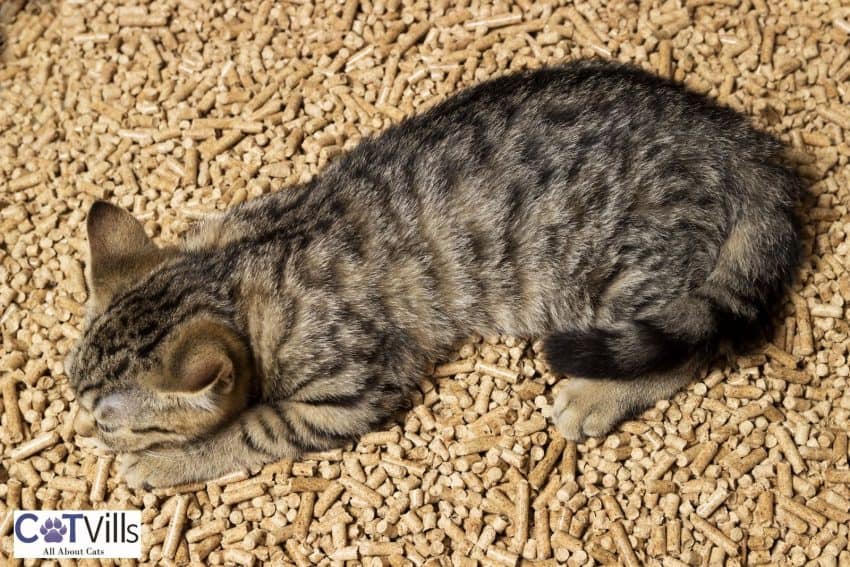
Kittens are energetic little furballs, but they tire quickly. So, kittens often fall asleep in the middle of a play session. As such, it’s not too strange to find them in the litter pan.
Moreover, it takes time for kittens to understand what litter is for. And since kittens love boxes as much as adult cats, it’s easy for them to confuse the toilet box with a cat bed.
#4 Your Cat Is in Labor
Is your cat pregnant? Then your female cat might be going into labor and freaking out!
First-time cat mothers often don’t know what’s happening when they’re about to give birth. Sometimes they sleep in the toilet box thinking they need the bathroom.
Moreover, most cats consider their litter box a safe space. And if there’s no other suitable location, the cat will choose the litter box to birth its kittens.
#5 Your Cat Is Stressed
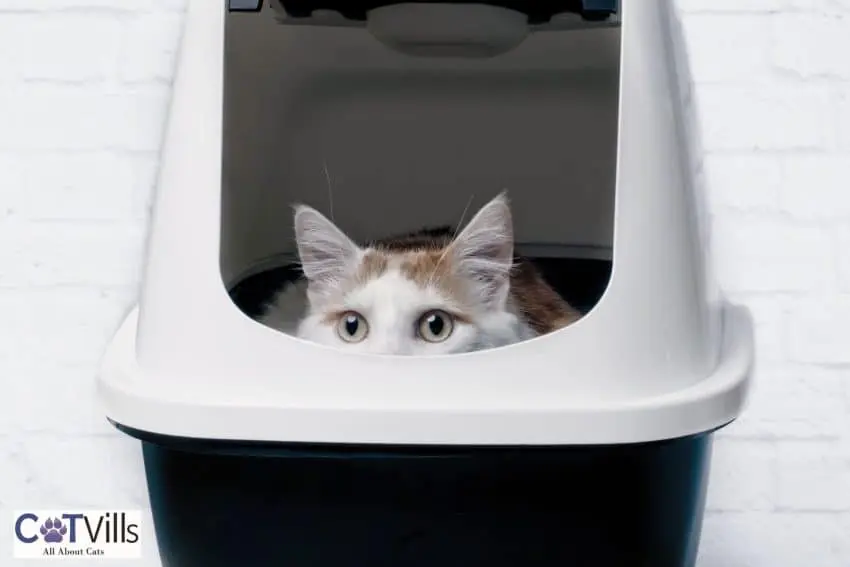
Stress is one of the common reasons for weird cat behavior, such as sleeping in the litter trays, hiding under the bed, or clingy behavior.
Whenever your cats feel exposed and threatened, they look for a safe place to rest where they don’t have to stay alert.
The litter box offers such comfort because it’s covered in your cat’s scent and is easy to defend.
#6 Your Cat Wants Privacy
Is your cat’s litter box enclosed or covered? Then it’s no wonder your pet loves napping inside – it’s dark, small, and secure, just like a closet or a cardboard box.
All cats like to sleep in hard-to-reach places where they can let their guard down and be vulnerable. It’s also a pretty good hiding place because you’ll rarely think to look for your cat inside the little tray.
#7 Your Cat Is Old
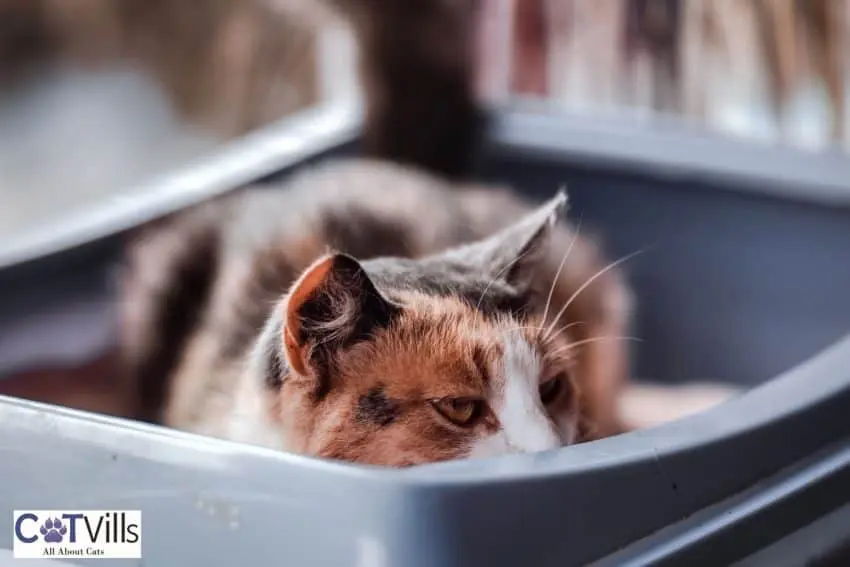
As a study explained, “36% of owners of cats aged 7–10 years reported that their cats had developed age-related behavioral problems.”
Inappropriate urination is the most common one.
Usually, older cats have problems reaching their toilet box on time because they’re not as agile. Some also have problems getting in and out of the tray due to arthritis or other medical issues.
Cognitive dysfunction is also common, making your cat confused about where it is and how to get back to its cat bed.
As such, it’s not surprising that some cat owners notice that their older cat prefers to spend their days napping in the litter tray.
#8 Adjustment Anxiety
Adjustment anxiety is another common reason for a cat sleeping in litter boxes. Cats often sleep in cages with their litter tray close by in an animal shelter.
As such, when you take these cats home, they’re so scared that they hide in the only familiar place they know – the litter box because it’s a source of comfort.
Fortunately, once the cat adjusts to its new home, it should start sleeping in normal places.
#9 Territory Problems
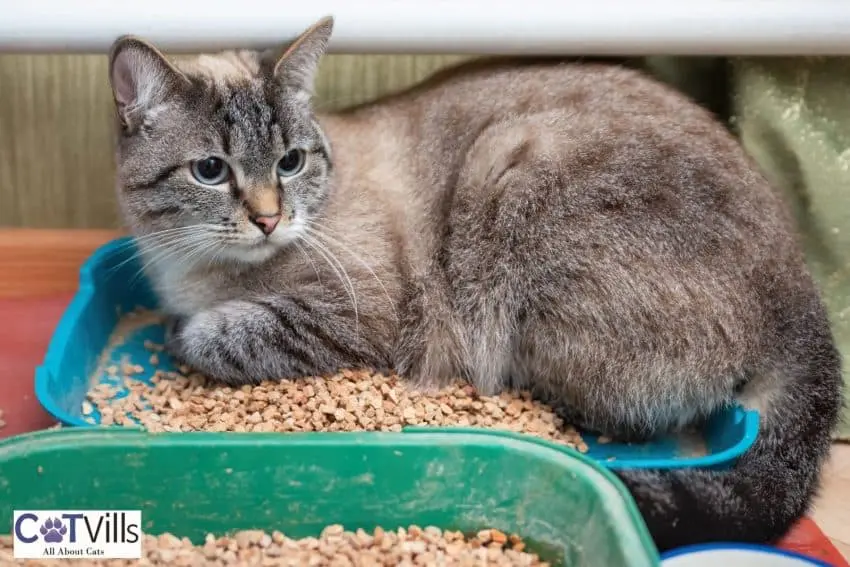
Do you have more than one cat in the household? Then lack of territory can force one of the cats to seek shelter in their toilet box.
As specialists from the Ohio State University explain, “Threatened cats often spend increasingly large amounts of time away from the family, in areas of the house that others do not use.”
So, if you notice that one of your cats is being a bully, it could explain why your other pets have chosen such a peculiar sleeping spot.
#10 Your Cat Is Weird
Sometimes, there’s no reason why your cat is sleeping in the litter box.
Some felines are weird and like to shock you with their behavior and watch as you try to figure out its meaning.
How Do I Stop My Cat From Sleeping in the Litter Box?
You don’t want your cat sleeping in the litter box, even if it’s spotlessly clean. Otherwise, you’ll find litter particles all over the house, and who knows what else.
So, what can you do to change your cat’s behavior? Here are six simple tips.
#1 Rule Out Medical Issues
Even if your pet seems healthy, you should take your cat to the vet, especially if you notice changes in how much your cat drinks or urinates.
Remember that cats hide their pain and discomfort very well, so you have to watch for the subtle signs of illness.
#2 Change the Box
As I already said, some elderly cats have mobility issues and can’t get in and out of the toilet box.
So, switching to a low-entry litter box for senior cats with shallow sides can help you solve the problem.
#3 Provide a Birthing Box
If you have a pregnant cat, provide a suitable birthing box in a quiet location and ensure no loud noises or people are bothering the other.
Don’t panic if the cat starts giving birth in the litter box. Move the mother and the kittens to a nesting box and clean them well. The mother mustn’t ingest too much litter, or she will get sick
#4 Create a Suitable Sleeping Spot
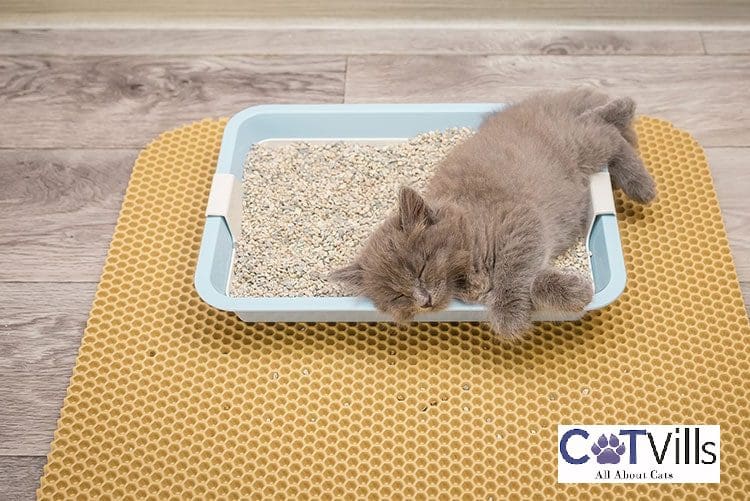
To prevent your cat from napping in an inappropriate place, you should ensure your kitty has a safe den where it can retreat in times of stress.
Just place a comfy cat bed or a cardboard box with towels in a quiet room and lure your cat to the sleeping spot with treats. Add more vertical space to your house and provide several perches.
Vets also suggest using a box with a similar shape to the litter tray to lure the cat.
#5 Reduce Stress
Try to keep your cat’s environment as stable as possible. If something has to change, give plenty of time for your cat to adjust, and don’t bother your pet if it hides under the bed or in the toilet box.
Talk to your vet about using anti-anxiety products for cats to calm your pet. And enrich your cat’s environment to ensure they aren’t bored when you’re not in the house.
#6 Solve Conflicts
To avoid conflicts between your cats, you should ensure that each pet has its food/water bowls, sleeping spots, toys, and litter box.
You need at least one box per cat, plus one extra. Also, ensure you’re paying equal attention to all your pets to avoid jealousy and possessive behavior.
And remember to introduce cats to one another slowly.
The Bottom Line
Cats are clean animals, so they rarely consider their litter box a suitable sleeping spot. Kittens are the exception since they’re still learning about the world.
Usually, such weird behavior in adult cats is related to mental or physical problems.
You should work with your vet to rule out an underlying condition or figure out what’s bothering your pet so much.
What do you think about this topic? Why is your cat sleeping in the litter box? Share your thoughts with us in the comment section.
Resources:
